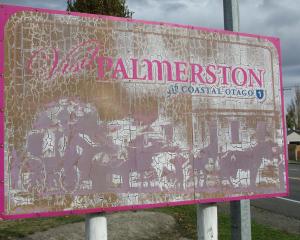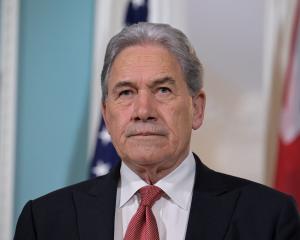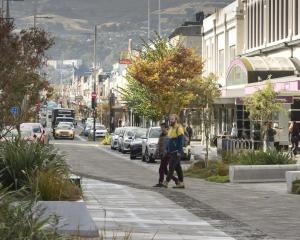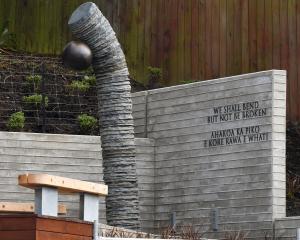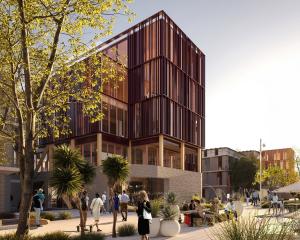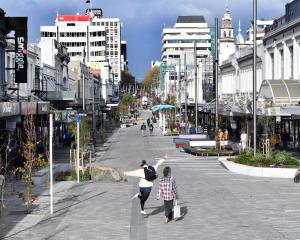Cr Dave Cull argues that the proposed Awatea St stadium should be 'parked'.
As the Dunedin City Council counts down towards the (apparently) final Stadium D-Day in February, it would surely be prudent to consider the economic context of our decision-making.
What is happening around us?
Eminent economists characterise the current financial crisis as the prelude to the worst global recession in a century, predicting a longer and deeper slump than first anticipated.
That is despite massive government intervention this time.
Anyone with the slightest knowledge of the Great Depression of the '30s would appreciate that is an ominous prediction.
Following years of government surpluses, New Zealand faces a minimum annual deficit of $2 billion: possibly much more.
The incoming government will have little money to splash around, especially after it honours its tax-cut promises.
Unemployment is predicted to rise from the current 4% to between 5% and 6% within a year.
That is anything up to a half more jobless than at present.
Dunedin businesses are laying off staff in numbers unprecedented since the early 1990s, in a city with the poorest suburbs in the South Island.
Ordinary people will have even less discretionary income than previously.
Banks are changing the conditions placed on businesses when renegotiating their borrowing.
The result has in some instances been failure of pre-arranged property deals, and even forced sales of sound businesses.
Tourist numbers arriving in New Zealand are falling and predicted to fall further.
The business outlook for the medium term is negative.
Retailer activity is slowing markedly.
Central and local governments and central banks the world over are reassessing their spending priorities. Witness Auckland.
Whole national economies in danger of insolvency are being propped up by funding bail-outs.
Despite all of the above, it seems that New Zealand, and Dunedin, have been impacted only moderately by the crisis, so far.
Unfortunately, much worse is on its way.
Explanations for the global crisis have one common theme: debt.
Debt for unearned consumption; debt against fanciful security inflated beyond any rational value: overwhelming mountains of unsustainable and unsupported debt.
Uncertainty is the recurring theme about a future too murky for anyone to discern clearly.
An ominous foreboding pervades the thinking of governments, businesses and financial institutions.
In this environment the Dunedin City Council is forging ahead, "unwavering", in the words of one councillor, with plans to borrow to the limit of the DCC group's debt carrying capacity.
Indeed the council will exceed its own prudential debt ratios in some coming years.
That borrowing is for a project that will not produce sufficient revenue to cover all its ongoing costs.
So it will continue, year on year, charging an impost on ratepayers calculated at some $5 million per annum.
However, that could rise quickly.
IF the stadium's revenues do not meet expectations and drop into the red, ratepayers will have to make up the difference.
If the council-owned companies' profits fall below predictions, and their dividends cannot meet the interest payments on the borrowing, ratepayers will have to make up the difference.
Why would we expect council company or stadium revenues to remain steady when most other businesses predict reduced profits or even losses?At the same time, the council is well aware of looming essential infrastructural spending which is not budgeted for in the Long Term Council Community Plan.
That includes stabilising the dunes at Middle beach and increased upgrade and maintenance costs for our water supply system.
Clearly, debt is unavoidable in some circumstances.
But as with family or business finances, civic borrowing should not be for consumables or luxuries.
It should be for essential infrastructure, paid for over several generations; or for projects that will create long-term jobs; or for investment that will produce sustained economic growth commensurate with the amount invested.
Only the most Pollyanna-ish cheerleaders claim any of those for the stadium.
The only beneficiary appears to be the university, which will hardly use the actual stadium anyway, but will acquire more land on which it is not required to pay rates.
So the city intends borrowing more than $90 million and rating its citizens, many of whom are the poorest in the South Island, to provide the university with an enormous attraction that will not cover its costs, at a time when the world-wide burden of reckless and unsupported debt is bringing financial markets, businesses and whole economies to their knees.
That is hardly prudent or responsible economic management.
What to do?
Abort the stadium project immediately? That is not a measured or indeed sufficient response.
It is not the stadium itself that is the problem, but its affordability, risks and opportunity costs.
And this is not just about the proposed stadium.
As a council we need to take a very hard look at all our planned capital spending and debt ongoing.
We need to prioritise.
More than one project may have to be parked.
And parking is what we should be doing with the stadium project - parking it until the mists of uncertainty and waters of liquidity clear: until we have a handle on more of the risks and their possible costs.
What emerges from the international rubble of losses and write-downs will not look the same as before, and it will not operate the same way as before. To protect our community, we must have the prudence, the wit and the sense of responsibility to pause and take another look at all our future spending and borrowing plans.
It is a commitment we must make as stewards for all of our citizens and most certainly for those generations to come.
• Dave Cull is a Dunedin City Councillor.

